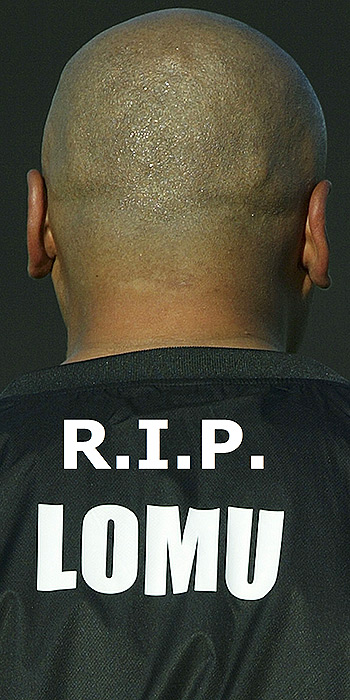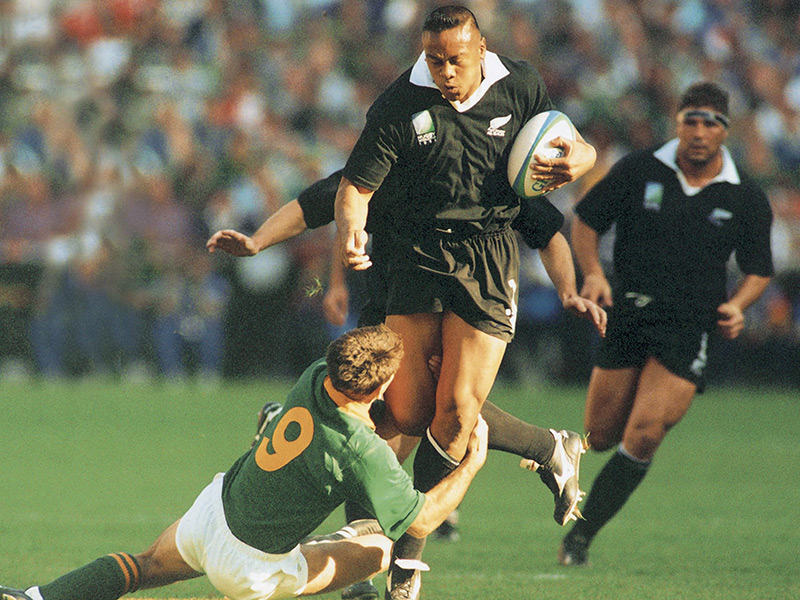Lomu: The 'freak' that revolutionised the game
Hailed as the sport's first global superstar, he shot to international fame at the 1995 World Cup in South Africa, a year after becoming the youngest ever All Black at the age of 19 years and 45 days. The All Black wing was remembered for feats such as his four tries against England and the way that he barged aside opposing defenders.
World Rugby president Bernard Lapasset and former England manager Clive Woodward both said that Lomu, who was forced out of the game by a chronic kidney disease, had changed the face of the sport.
"He really did take rugby to a whole new level. He was just one of the all time great rugby players, there is absolutely no doubt about that," Woodward said.
Lapasset told AFP that Lomu "was ahead of his time. Jonah Lomu gave an incredible new dimension to the game. He gave an incredible impetus with his driving runs."
At 1.96 metre (six foot five inches) and 120 kilograms (265 pounds), rugby had never seen a wing like Lomu when he made his first appearance at the Hong Kong Sevens in 1994. He was soon called up by the full All Blacks side. At his peak, Lomu could run 100 metres in 10.8 seconds. His power terrorised opposing defenders.
"Wings were normally small, nimble and agile and suddenly you had this huge guy and he was not big and slow, he was big and fast. He was amazing. We used to give him a huge amount of attention. If we could nullify him we could nullify the All Blacks," Woodward added.
Lomu's former opponents as well as legends of other sports paid tribute to the New Zealander's prowess as well as his dignity off the field as he battled a kidney disease, which forced him to have one transplant.
Lomu made his first international impression at the World Cup in 1995 where he scored four tries against England and eventually scored 37 tries in 63 Tests between 1994 and 2002. But shortly after his breakthrough 1995 tournament, he was diagnosed with the rare kidney disorder nephrotic syndrome, which eventually cut short his career.
"He's a freak, and the sooner he goes away the better," dejected England captain Will Carling said after the match.
Mike Catt who was repeatedly trampled over by Lomu in the game said: "I’m massively sad but the legacy he's left is incredible."
Lomu went on to play in a final against South Africa, that the home side won 15-12, but he was the star of the World Cup alongside Nelson Mandela who presented the trophy to the Springboks.
Oregan Hoskins, president of the South African Rugby Union, added: "Jonah was a simply unbelievable player but, as much as he was a mighty All Black, he had a special place in South African hearts because of the connection we made in 1995."
The year after the World Cup, rugby union became mainly professional and Lomu inspired a new generation of players.
"I don't think he understood the impact he had on the game," said Catt.
Even after illness forced him to give up playing, Lomu launched into charity work and the campaign to get Sevens into the Olympic Games. Lomu spoke before an International Olympic Committee meeting in Copenhagen in 2009.
"He spoke before more than 700 people, very naturally, with his faith and conviction. There was an almost religious silence and he recalled how Sevens had enabled him to escape a difficult life in his youth in Auckland," Lapasset said.
Lomu said he wanted his son to remember him for getting rugby into the Olympics more than his All Black career, according to the World Rugby president.
Lomu died nine months before the Olympic rugby tournament in Rio de Janeiro.
Lomu was inducted into the World Rugby Hall of Fame in 2011, when the sport's governing body said he had left an indelible mark on the World Cup. He later described the time as his darkest moment.
"I was this guy who'd been racing around down there on that field in 1999, running straight over people, scoring tries, winning games, having fun. And I ended up so sick that I couldn't even run past a little baby," he said in 2005.
In 2004, he received a kidney donated by friend Grant Kereama and, while his health improved, attempted comebacks were repeatedly marred by injury.
Lomu divided his time between New Zealand and France in his latter years with his third wife Nadene, with whom he had two sons, Brayley and Dhyreille. He returned to New Zealand in 2011 for the All Blacks' successful World Cup campaign, starring at the tournament's opening ceremony, but spent 16 days in hospital after a health scare linked to his kidney condition.
Doctors told him in February 2012 that his donated kidney had failed and he needed a new transplant.
Lomu said then that "everyone has to die sometime" and he had no regrets.
"I'm really lucky, I've already lived more in one lifetime than many would in six or seven lifetimes. For me, the important thing is to ask 'can you look in the mirror and say you've done everything to enjoy life?'," he said.
Agence France-Presse






























